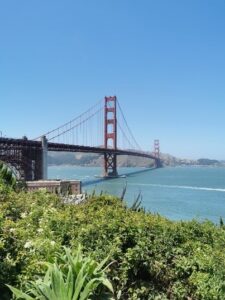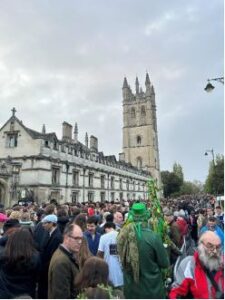Kategorie: ‘Electrical Engineering’
My Internship in Cork, Ireland
- Electrical Engineering and Information Technology M.Sc.
- Ireland, Cork
- QT Technologies Ireland Limited
- 03/2025-07/2025
As a master’s student in Electrical Engineering at RWTH Aachen University, I had the opportunity to complete a six-month internship at Qualcomm in Cork, Ireland, supported by the Erasmus+ Internship Programme. My goal was to gain practical experience in my field while improving my language skills and experiencing life abroad.
1. Application/Finding an internship
I did not specifically look for an internship in Ireland at the beginning. My main aim was to complete an internship during my master’s studies in a country where English or Spanish is spoken, so I could improve one of these languages. Going abroad was a priority for me. I had heard great things about Ireland from two friends who had previously lived and worked there for half a year, so Ireland quickly became a strong option.
I applied directly via the Qualcomm careers website for an internship position in their Cork office. After completing several interviews, I was fortunate to be offered a place.
2. Accommodation & Living expenses
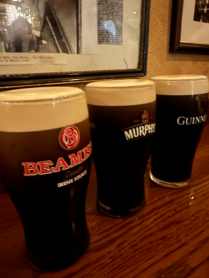
Different Irish stouts: Beamish and Murphy’s from Cork, and Guinness from Dublin.
©Niklas Groß
Shortly after receiving my internship offer, I began searching for accommodation. I was surprised to find that rental prices in Cork were quite high, especially considering the condition and furnishing standards of many of the available options. Fortunately, I was later informed that the company provides shared housing specifically for interns. I was able to rent a furnished 12 sqm room with a private bathroom in a four-person shared house located very close to the city centre. The house included a shared living room, guest toilet, and communal kitchen. The rent was €1000 per month – a flat rate that, as I understood, applied to all interns living in company-provided housing.
Grocery prices were similar to those in Germany. However, prices for personal care products were significantly higher, and alcoholic beverages in supermarkets were extremely expensive. Prices in pubs for a pint of beer ranged between €4.40 and €6.70 – quite steep, though not unheard of compared to places like Cologne. Eating out at restaurants was only slightly more expensive than in Germany.
For baked goods, Lidl offered a self-service bakery section very similar to the ones in Germany, with comparable prices. If you’re looking for high-quality bread, the English Market in Cork is a good place to go – though the prices there are significantly higher.
3. Everyday life/The internship
During my internship, I worked 37.5 hours per week as a Timing Engineer at the company. The office had a very international environment, with interns and colleagues from all over the world. This made for a dynamic and collaborative workplace, where English was the primary working language.
Although I’m unable to go into detail about my specific responsibilities due to confidentiality agreements, I can say that the experience significantly strengthened my technical and analytical skills. I also had the opportunity to work with state-of-the-art tools and contribute to real-world projects within a professional R&D environment.
Regular meetings with my supervisor ensured that I received consistent guidance and feedback, and I always felt well supported by my team. In addition, Qualcomm offered internal learning opportunities such as tech talks and knowledge-sharing sessions, which broadened my perspective on current trends and technologies in the industry.
The office was located within walking distance of the city centre, which made commuting very convenient. I had heard from many others that buses could be unreliable, but since I didn’t rely on them, I can’t confirm this personally.
4. Free time/Tips
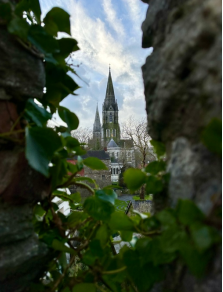
Elizabeth Fort, Saint Fin Barre’s Cathedral, Cork.
©Niklas Groß
Cork is a relatively small city, so you can explore most of the main sights in just a few days. Highlights within the city include Elizabeth Fort, Saint Fin Barre’s Cathedral, the University College Cork (UCC) campus, and the historic Cork City Gaol. A highly recommended walk leads from the city centre to Blackrock Castle, along a newly developed riverside promenade. On the way there or back, it’s definitely worth stopping by the Marina Market, a large indoor street food hall offering international cuisine and a lively atmosphere.
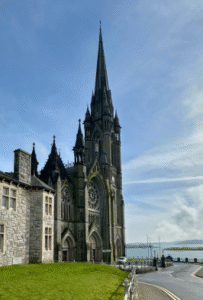
St Colman’s Cathedral, Cobh.
©Niklas Groß
Cork also boasts a vibrant and active pub scene, with events such as pub quizzes, live music – from traditional Irish tunes to international classics – beer pong tournaments, and more. Especially on weekends, there’s always something happening.
When the weather is good, relaxing outdoors is easy. In addition to Fitzgerald Park, Cork Lough and St. Patrick’s Hill are great spots to lie on the grass and enjoy the sunshine.
For short trips just outside of Cork, the harbour towns of Kinsale (about 1 hour by bus) and Cobh (25 minutes by train) are highly recommended. Both offer beautiful coastal views and a pleasant atmosphere for day trips.
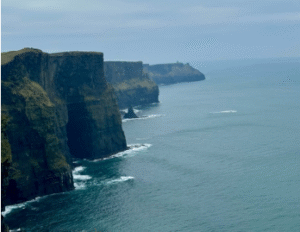
The stunning Cliffs of Moher on Ireland’s west coast.
©Niklas Groß
There’s also a WhatsApp group and Instagram page (corkinternationalstudents) specifically for international students. These platforms help organize a variety of events in the city, such as parties, pub crawls, karaoke nights, and more. They also arrange affordable tours to Irish landmarks like the Cliffs of Moher, cities such as Dublin or Galway, and scenic hikes to places like the Ring of Kerry or Coumshingaun Lough. The people involved are very welcoming, and it’s a great way to make new friends – including students from UCC.
Another cultural highlight is attending a match at the GAA stadium to cheer for Cork in traditional Irish sports like Hurling and Gaelic Football. When Cork reached the provincial finals and even the All-Ireland semi-final and final in Hurling, the whole city came alive with celebration and watch parties.
If you’re a fan of other sports, you can also catch international football matches at pubs like The Woolshed, which even streams the German Bundesliga – perfect if you want to see Borussia Dortmund win a match!
5. Conclusion
I truly enjoyed my time in Ireland. I had the chance to meet many friendly and inspiring people and gained valuable professional experience. Following my internship, I’ll be moving back to Cork to work full-time for the same company. This internship was an incredibly rewarding experience both personally and professionally.
My Research Stay at UC Berkeley
- PhD Candidate for Electrical Engineering
- USA, Berkeley
- University of California, Berkeley
- 05/2025-08/2025
- Preparation and organization of the stay:
I am currently in my final year of my PhD at the Center for Ageing, Reliability and Lifetime Prediction for Power Electronics and Electrochemical Systems (CARL), RWTH Aachen, where I work on analyzing the aging mechanisms of batteries using experimental and simulation-based data. Battery research is highly interdisciplinary, combining knowledge of electrochemical processes, experimental setups, engineering, and data analysis. Spending part of my research abroad had always been very important to me, as it offered the chance to gain new perspectives and access complementing expertise for my research. The energy, controls, and applications lab (eCAL) at UC Berkeley, with its expertise in algorithms, lifetime analysis, and data-driven methods, complemented my background and offered the expertise I needed for my analyses. To prepare for my time there, I organized the battery aging measurements I had started at RWTH Aachen so that they could be analyzed once I arrived at the lab. A professor at my institute from RWTH Aachen put me in contact with my host supervisor.
Organizing the logistics of a research stay in the US can be challenging. Finding accommodation in Berkeley on short notice was not easy, so I opted for an Airbnb, while shared apartments or nearby cities like Oakland offered more affordable alternatives.
- First steps after arrival in host country:
By chance, my first day at UC Berkeley coincided with the annual eCAL retreat, where we went lawn bowling and had dinner afterward. It turned out to be the perfect way to meet the whole group in a relaxed setting and to get to know the PhD students right away. Everyone was very welcoming, and a few of them gave me a tour of the lab. I also met my host professor in person that day, which made it easy to settle in and feel like I could start my research stay right away.
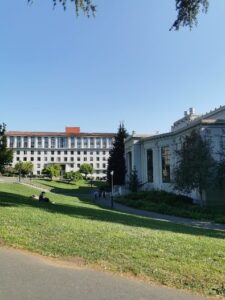
Campus of UC Berkeley
©Katharina Quade
- Academic experience:
eCAL had the feel of a close-knit group: about ten PhD students worked under the supervision of my host professor, supported by a handful of bachelor’s and master’s students. The culture and PhD process at UC Berkeley was noticeably different from what I was used to in Germany. At RWTH Aachen, PhD students often supervise theses and work closely with student assistants, whereas in Berkeley the emphasis was much more on individual projects and dissertation work without relying on large infrastructure and equipment. This meant fewer administrative and organizational duties for the PhD students at UC Berkeley, allowing researchers to focus deeply on their own topics. Each environment had its own strengths and weaknesses, and this exchange gave me the opportunity to integrate the strengths of the US PhD system into my work at RWTH Aachen.
The lab’s relatively small size made it easy to settle in and even though the students were spread across different campus buildings, communication was open and effortless. eCAL was also highly international, with students from a wide variety of cultural backgrounds. This diversity enriched our exchanges, blending technical discussions with cultural perspectives and insights into PhD programs.
- Financing:
The cost of living in the US, especially in the Bay Area, is quite high, covering groceries, leisure activities, and daily expenses. Fortunately, I lived close to a Trader Joe’s, which offered relatively affordable groceries. Getting to San Francisco on the weekends was very convenient thanks to the BART train, while within the city, buses and the metro were the main public transport options. For trips outside the Bay Area, having a car is essential. Renting a car in the US is comparatively affordable, but it requires a credit card.
-

The Golden Gate Bridge on a sunny day. San Francisco is just about 30 minutes away from Berkeley by train.
©Katharina QuadeLeisure:
Berkeley itself is a relatively small city in the East Bay, and since my stay took place during the summer semester, both the campus and the city were fairly quiet. Overall, I really enjoyed Berkeley and San Francisco as the area has a lot to offer, both culturally and culinarily. I visited Alcatraz, explored several exhibitions, and had excellent food in Chinatown and Little Italy. One thing to keep in mind, though, is the microclimates in the bay area: it can quickly turn cold, windy, or foggy.
California’s landscapes are incredibly diverse, and it is the US state with the most national parks. Many of them are accessible from the bay area, though usually a car is necessary. During my stay, I was able to visit Yosemite, Sequoia, Redwood, and Death Valley National Parks, each was impressive in its own way. I was particularly fascinated by how different the scenery can be within a single state: from the forests of Redwoods and Sequoias to the dry, hot desert landscapes of Death Valley.
- What added value did the stay have for my career prospects?
My research stay abroad was an important step for my professional development. It allowed me to work in an international research environment and gain insights into different academic cultures and PhD systems. I strengthened my expertise in advanced battery data analysis and honed my ability to work in interdisciplinary, multicultural teams. Global issues like climate change can only be addressed collectively, and this experience highlighted how much progress depends on collaboration across borders and disciplines.
- To what extent does my stay abroad have a sustainable character?
My stay abroad had a lasting impact in several ways. Beyond my own research, I built professional connections with professors, startups, and companies at UC Berkeley, creating opportunities for future collaboration. Networking is crucial in academia, and I am confident these contacts will remain valuable. I am still in touch with several PhD students and look forward to meeting them again in the future.
- Conclusion:
My time in California was definitely both professionally and personally rewarding. Engaging with students from diverse countries brought new perspectives to my work and daily life. Most importantly, the stay allowed me to focus and collaborate intensively on my research, which was crucial for successfully completing my PhD and ultimately deepened my passion for science and research.
My Internship at Axelera AI in Leuven
- Electrical Engineering, Information Technology and Computer Engineering M.Sc.
- Belgium, Leuven
- Axelera AI N.V.
- 11/2024 – 04/2025
1 Application
I discovered the internship posting on LinkedIn and applied via the official Axelera careers page in late July 2024. A few days later, I had a first screening call with the hiring manager who would be supervising my internship. Next there were two longer technical interviews to assess my abilities in software and hardware development. Finally, an executive interview with the team manager and an HR interview about cultural fit and compensation, respectively, concluded the process by late August. As soon as I had received the signed work contract, I applied for Erasmus internship support from RWTH, which required some more forms and signatures.
2 Accommodation
Leuven is a student town, owing to the presence of KU Leuven. This is Belgium’s largest university by number of enrolled students. For this reason, both studios and shared flats are widespread throughout the city, but nevertheless highly sought after.
A surprising number of accommodations is advertised and rented through Facebook, which was also how I eventually found the place I stayed at. It was a room in a shared house, within walking distance of the train station and my workplace. Like most rental contracts, mine had a fixed duration of one year, with a fee for early termination that I had to pay since I left earlier. The room also came furnished, so I could move to Leuven comfortably by train from Aachen, bringing just clothing, my bike and other personal items.
3 Costs
The rent was €520 with all amenities included, which was a fairly average market rate based on my impression. Overall, housing seemed to be slightly more expensive than in Aachen, especially for studio apartments where rent could reach €1000+.
In general, most items and services seemed to cost approximately 20% more than one might be used to from Germany. This becomes apparent at restaurants, but also for groceries and other everyday purchases.
One notable exception to the higher prices is train travel. A youth ticket for any route inside Belgium with any SNCB train costs about €8 regardless of time or distance, and can become even cheaper if bought in bulk or when traveling during the weekend. Furthermore, Belgian trains are very rarely delayed.
4 Work
The project I would complete during my internship was already outlined in the job description. Its main goal was to develop a compressor block in hardware that would reduce the amount of intermediate data to be transferred inside the Axelera AI processing unit during inference. Ultimately, this would enable higher energy efficiency and performance at the cost of slightly increased chip area and complexity.
My project was structured in the phases of algorithm research in the scientific literature, prototyping of promising algorithms in Python, and finally implementation of one or more algorithms in Verilog for integration within the DMA unit.
Even though Axelera generally allows remote work, the internship contract required 100% time in the office. This facilitated deeper connection and better knowledge exchange with my colleagues, and was easily doable for me with a 10-minute walking commute.
While several employees in the System Architecture team were located in Leuven, my direct manager was based in Zurich. To enable better collaboration, we strived to meet physically once per month. Sometimes, she came to Leuven, but I also traveled to Zurich on several occasions for one week at a time. All travel expenses were covered by Axelera.
5 Everyday Life
Leuven is located in Flanders, the Dutch-speaking part of Belgium. To blend in better with everyday life, I decided to learn Dutch and reached B1 level. Reading and writing is relatively easy as German native speaker, while speaking and listening may be slightly more difficult. I attended courses at CLT, a language school affiliated with KU Leuven. These courses took place twice a week in the evening, and the classroom was easily reachable on foot. On other days, I went to a nearby gym and joined the local running club.
Supermarkets close earlier in Leuven compared to Germany, which meant that I mostly had to do groceries on Saturdays. This also applied to other time-intensive activities, such as travel.
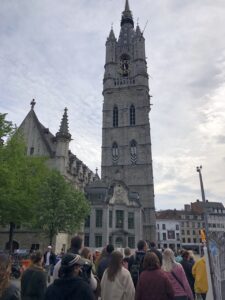
Belfry in Ghent
©Thorben Fetz
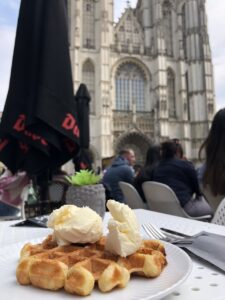
Liège Waffle
©Thorben Fetz
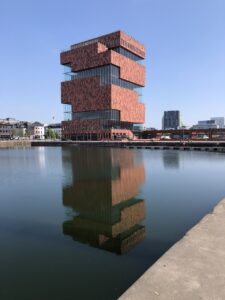
MAS in Antwerp
©Thorben Fetz
Taking advantage of the aforementioned very affordable train tickets, I visited most larger Belgian cities during weekends. Brussels is just 20 minutes away, but also Li`ege, Mechelen, Antwerp, Ghent or Bruges can be reached with direct connections. Even going to the seaside in Ostend takes less than 2 hours.

Train World
©Thorben Fetz
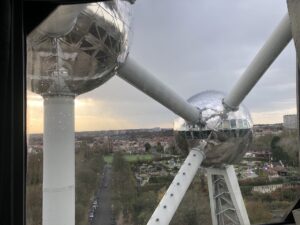
Inside the Atomium
©Thorben Fetz
Some other attractions I visited include TrainWorld in Schaerbeek and the Atomium in Brussels. Many museums offer discounted entry for students.
6 Conclusion
Overall, I am very grateful for the opportunity of conducting my internship at Axelera AI in Leuven. The experience has been invaluable, allowing me to develop both technical skills in algorithm and hardware design, as well as soft skills through international collaboration. Living in Belgium broadened my cultural horizons, while learning Dutch facilitated daily interactions.
The Erasmus funding was welcome in making this experience possible, covering relocation costs and a portion of the living expenses. This support allowed me to focus fully on my professional development and cultural immersion.
Internship in Liechtenstein
- Electrical Engineering, Information Technology, and Computer Engineering M.Sc.
- Liechtenstein, Schaan
- Hilti Group
- 03/2023 – 09/2023
Application
My internship was mandatory for the completion of my master’s degree in electrical engineering. For this,
I went to the headquarters of Hilti AG in Liechtenstein. Hilti is a tool manufacturer and one of the big
players within the construction market. Being an electrical engineer, initially I was not sure about
opportunities I would have there to combine the internship with my studies. However, through the main
careers page, I filtered all “electrical engineering” positions and found an intriguing position on battery
research. For me, the application was quite straight forward. After submitting my documents, my
supervisor reached out to me just a couple of days later. Here I have heard different stories. Some interns
were waiting for weeks for their response and still got accepted. The answering time depends on the
team, so a fast or slow response does not have to mean anything. My supervisor invited me to a technical
interview. In my case I did not get any detailed questions on certain processes or calculations.
Afterwards, HR invited me to a second interview. The main purpose was to check that I comply with all
regulations. Between submitting my application and receiving the offer, less than two weeks passed. After
I signed the contract, HR sent me a pdf containing all sorts of information on the area, leisure activities,
the dress code in the office, data to put in the forms for the Erasmus+ scholarship etc.
Accommodation
I applied about four months in advance, giving me a lot of time to prepare the stay. Shortly before the
start of my internship, HR sent me some forms, because the workplace is in Liechtenstein, but because of
EU regulations I was only allowed to live in Austria. With few exceptions, all interns live in Feldkirch, the
town at the border to Liechtenstein. For finding an apartment I recommend the websites wg-gesucht and
laendleanzeiger.at. I personally found my apartment on wg-gesucht. Since I wanted to move in with a
friend, we had some troubles to find a suitable apartment because there is not a lot of offers. In general, I
got the impression that many rooms are rented to people through personal contacts rather than the
internet. The rent is usually between 500 and 700 euros. For a restaurant visit I would account around
20€. Feldkirch has a large Interspar in the centre and another Spar towards the Liechtenstein border,
which are both quite expensive. There is also a Lidl and an Aldi (called Hofer) as cheaper options. Since
most shops close between 6 and 7pm already, I usually managed my weekly groceries on a Saturday.
Getting started in the first few days
No matter where you live in Feldkirch, the commute to work will always take around 20 minutes to work.
There is a train with four stops in Feldkirch and a stop right in front of Hilti. At the main station in Feldkirch
you can buy a yearly ticket allowing to take all trains and buses in Vorarlberg for free including the train to
Hilti. The ticket will always be valid from the start of the next month, so if you are in the area a couple of
days earlier, consider checking out the train station as soon as possible. Since many interns come and
go, it is also easy to get a bike which was especially nice during the summer days. Hilti also has some e-bikes that can be borrowed for 24 hours through the urban connect app. Next to figuring out
transportation, you also have to register at the town hall and at the tax office in Feldkirch. The tax office
will hand you out a form specifically for the commute between Austria and Liechtenstein, where you will
have to state your monthly income, expenses and enter personal data. After some time, you will receive a
letter stating the total amount of taxes that you have to pay for the year. Taxes are around 20% and HR
can always answer your questions regarding this topic. Finally, I also had to create a bank account for
Swiss Franks, because Hilti pays its salary in this currency. There are two main options. The ups bank in
Buchs and the Sparkasse Feldkirch. I decided to open a free Swiss Frank bank account on top of an
obligatory Euro bank account at Sparkasse Feldkirch. I had the option to transfer the money myself. This
option worked out well for me.
Everyday life
My daily routine started with getting up to get to work early. Although no one set any rules, everybody
arrived around 8am. There is a small gym on campus, and I went there in the mornings, since after work
it gets quite busy. The tasks vary a lot from one internship to another. I was mostly working
independently, but I also heard from interns with a packed schedule of meetings. In Liechtenstein, lunch
is already at 12 and some teams go even earlier. There is a canteen on campus, but the prices are more
on the Swiss side. With a few exceptions I always brought my own lunch and joined my team then. Every
floor has multiple kitchens that include a microwave to heat up food. Typically, everyone stays in the
office until 5pm. At Hilti, you are usually always occupied, and you get the opportunity to overtake some
responsibility. I had less free time, than I expected, because with the commute, sports, and cooking, a big
amount of the evening was consumed already.
Nonetheless, I had an amazing experience during my internship. There is always a huge number of
interns at the headquarters. HR organises get togethers every week, so I got to know many people
already from the start. A small team of interns organises workshops in a more or less monthly schedule.
The topic comes from employees within Hilti, so every time you discover challenges in a new area of the
company. I joined this organisation team, so I stayed in touch with these case owners and had the
opportunity to work on my presentation and organisation skills. Next to being insightful, the workshops
were a great opportunity to meet new faces and just have some fun. Furthermore, Hilti has a broad
offering of leisure teams. I joined the football team that meets once a week. During winter, we played
indoors and after April we went outside on a big pitch. Hilti also organised a campus run, sponsored
tickets for a concert in the opera in Schaan and took over the fee for the Zurich marathon. The sign up for
all these events is on a first come first serve basis, but they are announced in advance on the internal
webpage.
What to do around the area
During the weekends, I was mostly hiking. Cool hikes around the area are Schesaplana which can be
reached by public transport or Hoher Kasten. I definitely recommend doing Säntis and three sisters, but
they are a bit tricky in some parts, so they should not be done as the very first hike. On warmer days, you
can always find people who want to join to go to one of the close by lakes. There is Gamprin in
Liechtenstein, which is a small lake for bathing including changing rooms, a small football pitch, a
basketball court, and a beach volleyball net. Another nice lake is in Feldkirch. Everybody refers to it as
the Hilti Lake, but on a closer look at google maps, the actual lake is next to the Hilti Loch. A bit further
away, but a lot bigger is Walensee. During my time I also visited some cities. During one of the long
weekends around May and June there was enough time to spend several days in Vienna. There is a
direct night train between Feldkirch and Vienna.
Conclusion
Overall, I can recommend spending an internship at the headquarters of Hilti. The application process is
straightforward and the organisation before the start of the internship is also not too hard. HR knows
about all the regulations quite well and is always happy to answer questions. It is easy to find new friends
because there is so many interns there. The area with all the mountains and lakes is nice in summer as
well as in winter
Research internship at the University of Oxford
- Electrical Engineering, Information Technology and Computer Engineering, B. Sc.

May Day at Magdalen College Tower
© Benedikt Wahl - United Kingdom, Oxford
- University of Oxford
- 04/2023 – 09/2023
The questions, I probably got asked the most from friends and fellow students, is how I got the research
internship at the University of Oxford. That’s hard to answer since there is no clear path for that as far as I
know. I wrote e-mails to multiple professors at different institutions both in England and the United States
and one of them got back to me and offered me the internship in Oxford. Although there is always luck
involved, there is definitely one thing, I’d like to point out. Those professors get tons of similar requests
from maybe similarly suitable candidates. Hence, the application should be tailored to the lab in order for
the professor to even open the CV. In any case, I would always just give it a go and try it out.
Something to consider is that research internships are often unpaid. Although there are some scholarship
programs for internships in place, the money, you get, won’t cover all living expenses.
Regarding housing, the most convenient way is to text the housing officers of the colleges (I wrote an e-mail to all of them) and ask if they got free housing during the internship period. I got an offer from Exeter College and was really happy about it because it was easy to organize it from abroad. At the colleges,rent is usually paid per day, and comes in around 600-900£ per month from what I’ve heard. Something
that everyone should keep in mind is that the National Healthcare System (NHS) works different from the
German healthcare system. So I would highly recommend to register with a GP right upon arrival
because that gives you (1) an NHS number and (2) allows you to go to a GP faster when you need it.
Unfortunately, I didn’t know that and when I got sick, the earliest appointment, I was offered, was seven
days in the future. To get a faster appointment (at a private doctor), private travel health insurance can be

Duke Humphrey’s Library at the Bodleian Libraries
© Benedikt Wahl
very helpful. With that, I got an appointment the next morning.
So far this might have sounded a bit pessimistic but as soon as I got to Oxford, all the organizational
hustle was made up for. Hosting the oldest English speaking university in the world, the city is rich in
history and traditions which they preserved over the centuries. An event that I’ll never forget is May
Morning. On May 1st people from all over the city come towards the tower of Magdalen College. At 6 a.m.,
the bells of Magdalen college tower ring and the college choir sings to welcome the month of May.
Afterwards everyone walks through the city where plenty of other events take place. This tradition is
ongoing for over 500 years.
In general, the college structure makes Oxford stand out. To be part of this community as an intern, the
best way is to become an associate member of one of the middle common rooms (MCR). The middle
common rooms can be explained as a society for all graduate students at a college. Each MCR has it’s
own constitution which describes the conditions under which you can become associate member. At
Exeter College, that was pretty straightforward for me since living in their accommodation was sufficient
to request entry into the MCR. With the MCR membership at Exeter College, I got many perks including
subsidized lunch and dinner in the college’s hall (the dining room for students) as well as 24/7 access to
the college’s historical site. My favorite events, I could also attend thanks to the MCR membership, have

View from the garden of Exeter College over the Radcliffe Camera, University Church St Mary and All Souls College
© Benedikt Wahl
been formal dinners where we had really fancy food and dressed up in suits located in the college’s hall.
Formal dinners have been part of the college life for a long time and many traditions have been kept over
the centuries like the throne for the rector in the case of Exeter College. Besides the colleges, there are
as well plenty of other clubs and societies. In contrast to German universities, many of the sport clubs are
thereby really competitive since they compete on a national and international level. In general, Oxford is a
great place to connect to like-minded people from all over the world.
At work, there are some differences to German universities. To begin with, research groups tend to be
much smaller resulting in most professors supervising less students. My professor supervised just 4
students (including PhD candidates) and 2 post-docs. In addition to that, most researchers came to work
later than in Germany, resulting in the start of a typical working day just around 9 in the morning.
Overall, I really enjoyed my stay in Oxford and I will definitely stay in contact with my supervisor there in
the future.
Wonderful experience in Eindhoven
- Electrical engineering, information technology and computer engineering M.Sc.
- The Netherlands, Eindhoven
- Stichting imec Nederland
- 02/2023 – 08/2023
The internship
I really enjoyed the internship at the company imec. Imec is a belgian company and founded the Holst research center in Eindhoven in 2005. Imec is an industry related research center in the field micro and nano-electronics and deals with technical projects in the areas of health & vitality, energy &climate, mobility & industry 5.0. The application was quite straightforward, and I already had feedback and the (digital) interview within a few days. Starting the internship, I noticed right away that the team is quite young and insanely nice and friendly. Everyone is super helpful, open and you feel right at home. There were always recreational after-work activities with the team that you could participate in if you wanted to. Since the team was also very international, it was no problem that I didn’t speak the language, because everyone spoke English anyway. The Holst center is located on the so-called High Tech Campus. On the High Tech campus, many different technical companies are located and there is an area with a supermarket, a few restaurants where you can eat something at lunchtime and a gym. Due to the many green spaces and a small lake, the High Tech campus is also suitable for a walk and therefore quite a nice location for an office.
My internship was part of the health department where an implantable stimulation electrode was developed. For me, that was the perfect project as it combined the electrical engineering and medical aspect in such an interesting way. I learned a lot and I felt very valued because my opinion and ideas were very well appreciated by the rest of the team. Beside the daily work I also had a weekly progress meeting with my supervisor and imec, where we discussed my latest work and the upcoming steps. I felt very well taken care of, as thoughts and ideas could be freely expressed and my questions were always answered.
Accomodation and living expenses
One of the more difficult aspects was to find a room to stay, since there are generally too few housing options for students in Eindhoven. I used the site kamernet.nl and was lucky to find a room. The site has a monthly fee in order to be able to contact the landlords, but I would advise everyone to invest this money. I wouldn’t recommend using Facebook groups, because there are many scammers. The rents are relatively expensive, and one must expect about 500 – 600 € for a room in a shared flat. In general, the Netherlands is a bit more expensive than Germany, both for food but also for going out.
Eindhoven and surrounding
Eindhoven is a modern city. The city center is quite large and there are many stores, restaurants and bars. In particular, there are also somewhat exotic restaurants such as Indonesian or Ethiopian. Due to the existing university, there are also many young people around. Especially in summer, the various parks are very well attended and are very nice to enjoy the weather and nature. It is advisable to get a bicycle for the time here, as this is the best way to get around. There are very good and safe bike paths and almost everything is optimized for cyclists. I took mine from Aachen, but otherwise there is also the possibility to rent a bike at Swapfiets. To travel to other cities on weekends, the trains are particularly suitable. I can only recommend at this point to visit the cities of Utrecht and The Hague, because they are both beautiful. The app “9292” shows all bus and train connections within the Netherlands and is therefore very useful.
Conclusion
All in all, it was a wonderful experience. I was able to learn a lot during the internship and also the working atmosphere was very friendly and welcoming. The company imec has a lot of different and very exciting projects and therefore I would recommend everyone to have a look around here if you are looking for an interesting internship.
Internship in Eindhoven
- Electrical Engineering M.Sc.
- Netherlands, Eindhoven
- ASML
- 04/2023 – 08/2023
Application:
As I was looking for a place for my mandatory internship, I was first and foremost looking for a good company to stay at. The actual country to which this internship would take me was secondary to this for me, although the idea of living outside of Germany for a while did excite me. Due to the Erasmus Internship program I could freely explore internship vacancies within the European union without much worries, which opened many possibilities for interesting companies. The application process in my experience is similar to many German companies, although the interviews and documents were of course in English.
Accommodation & Living expenses:
Finding accommodation in the area around Eindhoven is hard. The housing market in that region is quite exhausted due to a high number of students who are attending the local university, and the local high-tech campus with large companies like Philips and ASML who have employees with much larger budgets looking for flats as well. The prices for rooms in shared flats are high, and even then, getting a place in one is difficult. Furthermore, some local (private) student housing providers only accept students of the local university. Due to the short duration of my stay, I did not have much success in getting accommodation through the local web portals like kamernet which are popular to find roommates either. In the end I luckily found a stay through an initial Airbnb booking, but this method is far from reliable. The expenses for groceries are higher than in Germany, but still affordable. The main problem is for sure finding accommodation.
Everyday life / The internship:
One of the most important tips for everyday life is surely to get a bicycle. The entire region is very accommodating for cyclists, and with the little height differences in the Netherlands cycling is a very comfortable way to get around. My company had an entire bicycle parking garage, as well as bicycle paths. Downtown areas too provide easily accessible parking spaces for bikes, which often makes them the most reliable method of getting around. It is often times even faster than taking the car. There are offers which rent out bicycles for quite a good price on a monthly basis, with full insurance as well, which I would recommend looking into so that you don’t need to bring your own bicycle with you.
During the internship the people I have encountered were all quite cheerful and not very keen on hierarchy. It is common to talk on a first name basis with every superior, and all members of our team were sitting in one open office with an open-door policy (well we didn’t have doors after all). There is a large focus on mental health, preventing burnouts, and team building, which was very nice to experience. As an intern I profited of this fundamental attitude a lot, since I was free to go around and ask anyone for help if needed and got to know the people much quicker than I would have with individual offices or a more secluded workspace. I felt part of the team quickly, and towards the end when some of my coworkers referred to me when tackled with problems I had dealt with during my own project I felt like the team had properly included me although I was bound to leave again.
Free time / tips:
As mentioned above, I would heavily recommend bringing or get a bicycle to get around. Other than that, I can recommend asking coworkers for help if you are looking for anything or need help with something, even outside of work. From my experience they are happy to help you settle in and get adjusted quickly.
In my opinion the city of Eindhoven is not that much of a tourist attraction, so look around a bit further to see where you want to go in your free time. There sure is a lot to see, just maybe not right in front of your doorstep.
Conclusion:
All in all, I can recommend an internship in the Netherlands very much provided you can find an accommodation, where availability heavily depends on the city. The country is especially appealing to students with its focus on bicycles, which are a lot cheaper to maintain than a car. The cost of living, although more expensive than Germany, is manageable. The people are very welcoming, and it’s quite fun that many are excited to test their German skills when they learn where you’re from. The culture and language are close enough to German so you can get around, while still providing the experience of a foreign country. In case something goes majorly wrong you can return to Aachen within a few hours so that the first longer term foreign stay is not all too scary. In conclusion, for anyone who wants to dip their toes into going abroad, going to the Netherlands is a great start.
Consulting internship in Vienna
- Electrical Engineering and Business Administration M.Sc.
- Austria, Vienna
- Capgemini Consulting Österreich
- 10/2022 – 02/2023
Motivation and formalities: Before writing my thesis, I wanted to take the chance to get to know another business sector and to experience what it’s like to live in the beautiful city of Vienna. Therefore, I applied for a consulting internship at Capgemini Invent. The application process was very quick and the colleagues I met in the process gave me a very good impression of the work culture and lifestyle in consulting. Since I am not European, I needed a work visa, which is theoretically easy to get if you do an Erasmus internship. Unfortunately, the administrative department of the company had no experience with Erasmus interns, so I had to do a lot of research and contact many institutions.
Preparation: I started preparing four months before the start of my internship, and the time was just enough. In my case, the most difficult part was getting the work permit, but in general I would say that after accepting the internship offer, the only thing you have to prepare is the accommodation. I looked for a shared apartment in WG-Gesuch because I didn’t know many people in Vienna. I was very lucky to find a very friendly, open and helpful flatmate. The apartment was very modern and spacious and was located in the 16th district and very well connected to the office, but also to the city center and only 10-15 minutes away from my favorite cafes and bars in the 7th district. To get there, I took the night train from Aachen to Wien Meidling Bahnhof (and then the subway to the apartment) 10 days before my first day of work, so I could settle in well in Vienna. I can only recommend this, because during this time I was able to enjoy the warm September days, take care of some organizational things, get to know my flatmate better and meet people who are now very good friends of mine.
- Internship Search: I found the internship through LinkedIn and didn’t apply to anyone else because they got back to me very quickly and made a very good first impression.
- Apartment search: Via WG-Gesucht. I would 100% recommend a WG. I have also heard of other search portals like housing anywhere or willhaben. There are also accommodations in the STUWO dorms and many private and very modern student apartments.
- Phone or bank/account opening: Was not needed.
Formalities on site:
- Health insurance: My colleagues and I were automatically insured by ÖGK. For the insurance card, I had to submit a photo and it was delivered to my apartment. I then went to the general practitioner with the card. That worked very well.
- Everyone has to register their address and also deregister when they move out.
Everyday life/leisure: The five months in Vienna were a wonderful experience. Since I arrived at the end of September, I was able to do some wine hikes at Wilhelmina Berg, Kahlenberg and Nussberg. As well as a grills and chillings by the Danube. In the colder months my friends and I spend time in various museums (recommend the long night of museums; Mumok, Albertina, Albertina Modern, Leopold and the Kunsthistorisches Museum), bars (Monami, Café Anno, Prosecco Bar, Liebling), cafes (Ramasuri, Wirr, Ulrich & Erich), exhibitions, small concerts, pop up vintage stores and the Naschmarkt.
I can also recommend a visit to the ballet, the opera, a musical and a Christmas concert. During the Christmas season, there is a Christmas market on almost every corner. My favorite is the one at Spittelberg, but the Christmas market at Spittelberg and the one at Schönbrunn are also worth a visit or two. You also have to keep in mind that during the week I could only go out for dinner or drinks because I worked around 50 hours a week, but on the weekends I could enjoy everything Vienna has to offer. As for sports, my flatmate, some friends and I were members of “myClubs” (like Urban Sports in Germany) and could visit many different studios in the city. Another option is to sign up for university sports classes (USI).
- Going Out: There are many cheap and also fancy bars around Schwedensplatz and also in the 6th, 7th and 8th district. My favorites are the ones mentioned above. For live music, there are many bars on the “Gürtel”. For partying, my favorite clubs are Grelle Forelle (mostly techno) and Volksgarten (eclectic and mostly commercial music), but there are many others (Pratersauna, Praterdom, O Club, VIP, etc.). I’ve been to Vienna in the colder months, but I’ve heard there are lots of raves and outdoor parties in the summer.
- Culture shock: Only positive things! My flatmate was very welcoming and introduced me to her friends. At work, everyone was also very friendly and we did many activities together outside of the office. There were many new young co-workers like me, so it developed into a nice friendship. At a salsa night, I met some Erasmus students with whom we explored the city together and created unforgettable memories. I hope to see them again soon!
My experiences in Sweden – enriching on a professional and personal level
- Construction and Robotics M.Sc.
- Gothenburg, Sweden
- Volvo Group
- March 2022 – December 2022
My decision to seek out an internship abroad was motivated primarily by the opportunity for professional growth. I was motivated to join my host institution- Volvo group in the department of Volvo trucks, for digital and flexible manufacturing plant, for several reasons: Firstly, it is a completely international organization, bringing together diverse collaborations between researchers from all over the world. I was very excited to gain diverse, international, and interdisciplinary perspectives on manufacturing and computer vision as I believed this could offer me a new kind of comprehension of global opportunities. I was also looking forward to building connections with colleagues from my host institute and experiencing first-hand how they approached their work and how their daily working life looked like. Secondly, the fact that the institute was in Gothenburg, Sweden appealed to me as I felt that the new context could offer me unique insights into the research field of Digital productions in real scale industry.
On a personal level, I also believed doing my internship abroad could provide me with the challenge and room for growth offered by new and different surroundings and the opportunity to meet new people. I knew Gothenburg has a beautiful historical center and I was excited to explore the architecture and history of the city. After several months of lockdown due to the Covid-19 pandemic, I found the prospect of new experiences especially energizing and fulfilling.
During my internship I was entrusted with a research project on Computer vison for overhead cameras and AGVs and received the opportunity to work as a researcher with doctorate students and professors from Chalmers University, Gothenburg. Research projects provided me with extremely enriching and fulfilling experiences, in which I learned even more than I could have imagined.
Within the scope of the multiple projects, I explored different methodologies to be able to quantify effectiveness of ARTags- Apriltags, ArucoTags considering light effects, occlusions, speed of detection and tracking. This entailed discussing the advantages and disadvantages of each tags with my team members, critically reviewing and presenting about previous research and learning to practically apply the methods. I worked on strategies for image fusion from multiple cameras and segmentation models as well as computer vision for distributed systems.
Besides cultivating fundamental research competencies, I also developed various soft skills. I cultivated professional and communication skills by interacting with colleagues on a daily basis and working closely together with team members. In doing so, I learned a great amount from my colleagues and their experiences. I both received the opportunity to hold presentations but could also attend lectures given by my colleagues to directly learn from them how to communicate ideas and research findings in an optimized way. I also learned when it was important to ask for help from others and became more confident in taking initiative and contributing my own ideas to the project. By juggling between different tasks and projects, I was able to improve my time management skills and set priorities to become more organized. This also helped me to optimize my work efficiency but also recognize my limits and learn to communicate if I wouldn’t be able to finish a task in the allotted time.
I very much appreciate the large amount of support I received from my host IAESTE and Volvo. I met with my supervisors at least twice a week, sometimes even more frequently and they took a lot of time to guide me and integrate me into the working group as much as possible. My supervisor also often asked me for my opinion and my ideas, which I cannot thank her enough for. Being able to voice my own thoughts and viewpoints proved to be an invaluable opportunity to self-sufficient and independent creative thinking.
Finding accommodation in Gothenburg was most likely one of the most difficult parts of my stay abroad. It was very difficult to find an apartment through online websites from Germany – most of them were in Swedish, many proved to be scams and non-existent and the rest were very expensive. My host institute and IAESTE Gothenburg helped me. My advice would be to start searching for accommodation as early as possible and ask for help from others who are living there.
All of my colleagues at the Volvo trucks are very welcoming and friendly, allowing me to feel completely included and happy during my time there. I gained the opportunity to meet and spend time with many new people. I learned a great amount from them and cherish the memories I have with them. I did get the chance to meet many local people outside of my internship and I was still able to explore a large amount of the city life and surrounding areas with my colleagues, which made me feel more connected to the place I was living in.
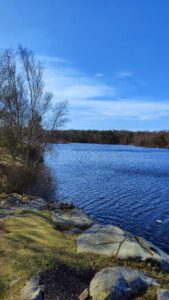
© Gaurav Makwana
In my free time, I would meet with friends from my work and explore the city. I enjoyed going on bike and scooter rides, exploring islands, visiting different historical sites, going to local cafes and restaurants to enjoy FIKA culture, finding the tastiest croissants and travelling to nearby cities or villages. Gothenburg is also close to the sea so I would strongly recommend to head down to all islands and go hiking and swimming there in some of the bluest cold waters you can find. I found the public transport system in Sweden to be very useful for short trips and affordable.
The living costs were in my experience higher in Gothenburg, as compared to Germany. I am therefore very grateful to Erasmus+ for giving me the opportunity to pursue an internship abroad and financially supporting me.
I attended an intercultural seminar and found this to be very helpful to get into a mindset that allows you to make the most out of your time abroad. It also teaches you that any difficulty or hardship that you face in the process can be a valuable learning opportunity. For these reasons, I would recommend it to other students, especially those who have never been abroad before or are looking to gain new insights and perspectives onto their upcoming journey.
My studies and previous research experiences provided me with foundational tools and background knowledge that I could draw from throughout my internship. By being able to apply these skills and competencies, I was able to strengthen and build on to them. This allowed me to cultivate essential research skills and grow confidence in putting them to practice.
Due to the rewarding and fulfilling experience I had during my internship, I feel highly motivated to pursue my studies and to maximize the insights I gain from my courses and professors. The experience also incentivized a future career in Computer vision and Digital manufacturing. Through my internship I realized how important it is to approach a digitalization topic from different angles and perspectives in order to fully understand it and to be able to implement efficient and safety policy measures aiming to mitigate the problems. This taught me how diverse the field can be and how important it is to think creatively and maintain an open mindset for learning from others, regardless of the stage you are in in your career. This reinforced and strengthened my motivation for pursuing a career in global Digitalization strategies.
In summary, while my expectations that I would learn a great amount about the field of Computer vision and develop professionally were fulfilled, my experience abroad also turned out to be very enriching on a personal level – far more than I had anticipated. During my time in Gothenburg, the new people I met, the unique and historical surroundings of the city and the positive and challenging experiences I was confronted with paved the way for growth and self-development. It also made me more open and adaptable to setbacks and helped shift my perspectives to ones in which I could more easily cope with and learn from mistakes.
I believe challenges during an experience abroad are inevitable but that they ultimately prove to be valuable learning opportunities. As eliminating them is not an option: to reduce problems, I believe it is important to plan as much as possible. In my opinion, however, it is more important to anticipate that unexpected outcomes, both good and bad, are bound to come your way and that the way you deal with them will shape your experience.
If you receive the opportunity to do an internship at the firm like Volvo for Research, I would highly recommend to grab the chance. Volvo for Research is a very open-minded and welcoming institution, tailored towards international cooperation. It is a place that fosters growth and openness. I am very thankful that I was able to spend my ten month internship there and would like to express my sincere gratitude to my supervisor and colleagues at the Volvo trucks, as well as to those at RWTH Aachen supporting the Erasmus+ traineeships abroad.
My experiences in Bristol
- Electrical Engineering, Information Technology and Computer Engineering (M.Sc.)
- United Kingdom, Bristol
- Infineon Technologies U.K. Ltd.
- March 2022 – August 2022
I lived in Bristol for five months as part of the UNITECH programme. The programme aims to connect engineering students with each other and with companies and to promote the development of soft skills. Part of the programme is a semester abroad at one of the participating universities in Europe and an internship at one of the companies. I decided to do an internship at Infineon Technologies UK Ltd., which at the same time covered the industrial internship I had planned in my Master’s programme.
Through the UNITECH programme, I already had direct contact with Infineon’s HR department, which meant that there was no need for a traditional application process. I wanted to do the internship in a non-German-speaking European country and work on both technical and non-technical tasks. Therefore, a position in the sales area in Bristol was suggested to me, which I accepted after a discussion with my future supervisor.
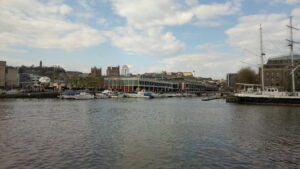
© Maike van den Berg
I was paid like a graduate student for the internship, which in my eyes was a high salary for an intern by German standards, but not necessarily for young professionals. The funding of the internship as an Erasmus+ internship was especially helpful when applying for a visa.
Because of the Brexit, I needed a visa to be able to work in the UK. The process – as mentioned above – was greatly simplified by the Erasmus funding. I applied for a Tier 5 visa with the help of the RWTH. I had to apply for a Certificate of Sponsorship from the British Council, with the RWTH as the sending institution and the company as the receiving/host institution. With this Certificate of Sponsorship, I was then able to apply for the visa online.
I found a room in a shared house in Bristol through SpareRoom, which is similar to WG Gesucht. Living in Bristol is very expensive and I was lucky to find something affordable close to the city centre. Right at the beginning I bought a British prepaid card (ASDA Mobile) so that I could then open a bank account. It was all done online and I went to Lloyds Bank.
My experience in Bristol can be divided very well into professional and private.
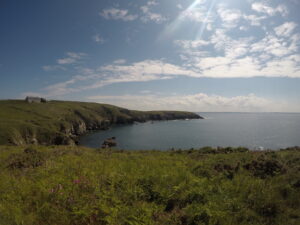
© Maike van den Berg
The internship didn’t really live up to my expectations, partly due to the fact that my supervisor left the company a few weeks after the start of the internship and there was no real replacement, and partly due to the office culture at Infineon in Bristol. Due to the restructuring following the termination of my supervisor, I often lacked a direct contact person and received little feedback on my work despite repeated requests. This was depressing, especially because I had no experience in the sales field and was therefore often somewhat disoriented. However, the internship also included technical projects, which I enjoyed much more and which made me feel more comfortable in the team. In addition, there was little active social life in my office and most of my colleagues were much older than me. Even though I had consistently good experiences in direct contact, no real personal relationships were formed.
These rather disillusioning experiences were more than made up for by everything outside of work! Through my housemates, I had a lot of contact with people my own age locally. Unfortunately, I wasn’t allowed to join any societies at the university because I would have had to be a local student, but I did find a basketball team and made friends through it.
I found Bristol to be a great place to live. It’s a very progressive city with a great arts and culture scene and lots of concerts, some of which are free. There is an almost endless choice of vegan restaurants and many local ciders and beers. The harbour in the city adds to the atmosphere and there are many beautiful parks for warm summer evenings (I was very lucky with the weather during my time there!). Also, the proximity to Wales offers many opportunities for beautiful hikes in the hilly countryside. Unfortunately, the national parks there are not so easy to reach by public transport, so we often rented a car privately via Karshare.
Compared to Germany, the UK is more expensive in all areas. The cost of living was quite high and I found public transport especially expensive.
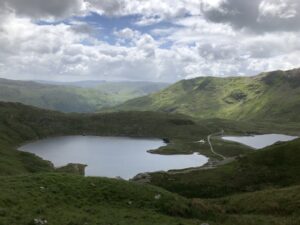
© Maike van den Berg
That’s why I bought a bicycle right at the beginning, which saved me a lot of expensive bus rides.
I am more than happy that I was able to do the internship in Bristol! The internship itself probably helped me the most in that I now know what is important to me in a future job and how I would (not) like to work. At the same time, of course, the insight into a large company was also interesting, as it gave me the opportunity to work with a wide variety of people at Infineon’s different locations.
Everything aside from the internship was what particularly enriched my time in Bristol. I found the British people I met to be incredibly friendly and open and I felt like I was living in a city where many things are possible.


